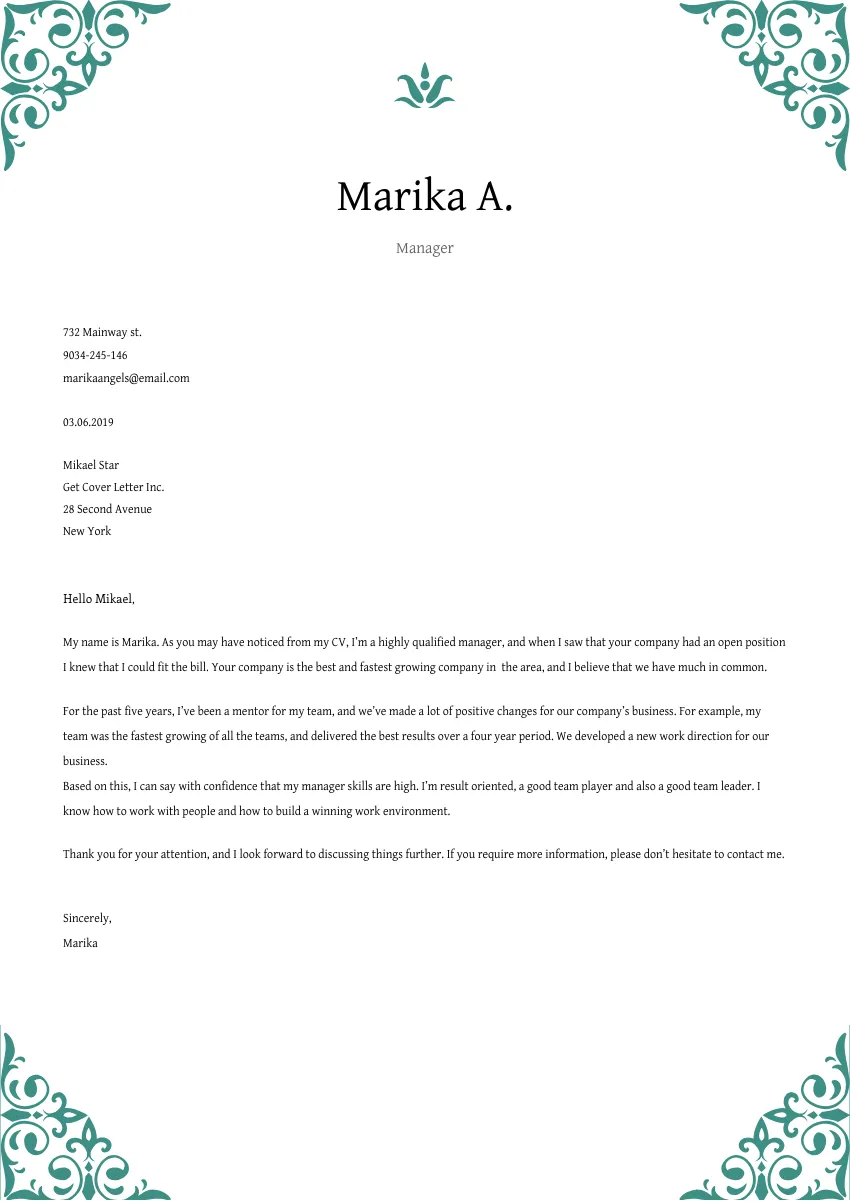Understanding the Importance of a Cover Letter
In the competitive landscape of job applications, a well-crafted cover letter is your secret weapon. It serves as your first introduction to a potential employer, offering you a crucial opportunity to make a positive impression and distinguish yourself from other candidates. A cover letter for an office clerk position isn’t just a formality; it’s a strategic tool designed to showcase your experience, skills, and personality in a way that a resume alone simply cannot. It allows you to narrate your career journey, highlighting your achievements and demonstrating how your qualifications align with the specific requirements of the role and the values of the company. A compelling cover letter can significantly increase your chances of securing an interview by capturing the hiring manager’s attention and persuading them to delve deeper into your qualifications.
Key Components of a Successful Office Clerk Cover Letter
To create a winning cover letter, you must include several key components, each playing a vital role in conveying your suitability for the office clerk position. The format should be professional and easy to read. Start with your contact information and the date, followed by the hiring manager’s name (if known) and the company’s address. The body of your letter should open with a strong, attention-grabbing introduction that clearly states the position you are applying for and how you learned about it. The main body should then highlight your relevant experience, skills, and accomplishments, providing specific examples to demonstrate your capabilities. It’s crucial to tailor your letter to the specific job description, emphasizing the skills and experiences most relevant to the role. Conclude with a call to action, expressing your enthusiasm for the opportunity and your availability for an interview. Finally, make sure that you proofread your letter meticulously for any grammatical errors or typos before submitting.
Contact Information and Header
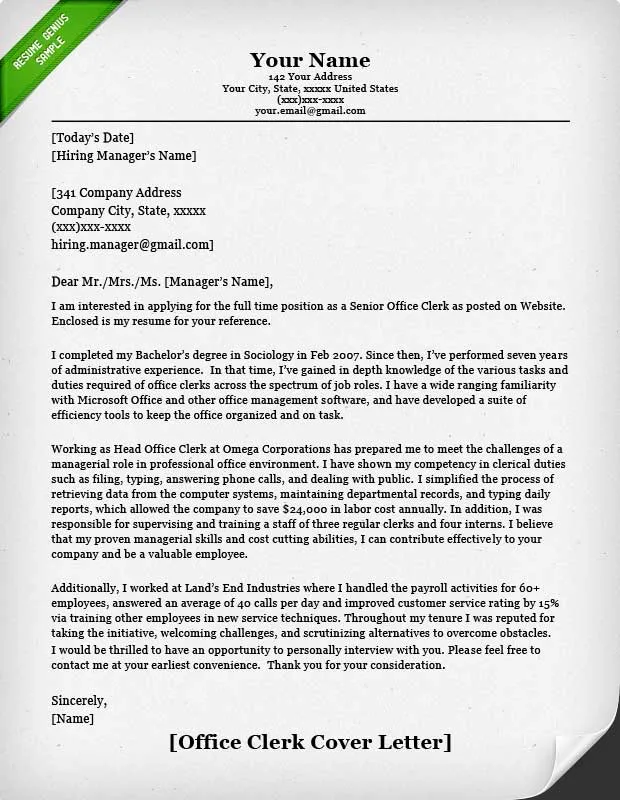
The header of your cover letter sets the stage for a professional presentation. Begin by including your full name, address, phone number, and email address at the top of the document. This information ensures the hiring manager can easily contact you. Ensure your email address is professional-sounding. Underneath your contact details, add the date, followed by the hiring manager’s name and title (if known), and the company’s address. If you can’t find the hiring manager’s name, use a general salutation like “Dear Hiring Manager.” The header should be clearly formatted, using a readable font and consistent spacing, which enhances the overall readability of your cover letter and signals attention to detail.
Greeting the Hiring Manager
The greeting is the first point of direct contact with the hiring manager, making it a critical element in setting the right tone. If you know the hiring manager’s name, use a formal greeting such as “Dear Mr./Ms./Mx. [Last Name].” This personalized approach demonstrates your attention to detail and initiative. If you don’t know the name, a general greeting like “Dear Hiring Manager” or “Dear [Company Name] Hiring Team” is acceptable. Avoid generic greetings like “To Whom It May Concern,” as they lack personal touch. Make sure you spell the name correctly. A well-crafted greeting shows respect and sets a positive tone for the rest of your cover letter. It immediately signals your professionalism and your effort in tailoring your application to the specific recipient.
Crafting a Compelling Opening Paragraph
The opening paragraph is your first chance to capture the hiring manager’s attention. It should immediately state the position you’re applying for and how you learned about the opportunity. If you were referred by someone, mentioning their name can be beneficial. Your opening should be concise and engaging, highlighting a key skill or a relevant experience that makes you stand out. For example, you might start by expressing your enthusiasm for the company and the office clerk role, followed by a brief statement about your relevant experience and what you can bring to the position. The goal is to create a compelling first impression that encourages the reader to continue reading. The best opening paragraphs clearly state your intent, demonstrate your knowledge of the company, and showcase your initial qualifications.
Highlighting Relevant Office Clerk Experience
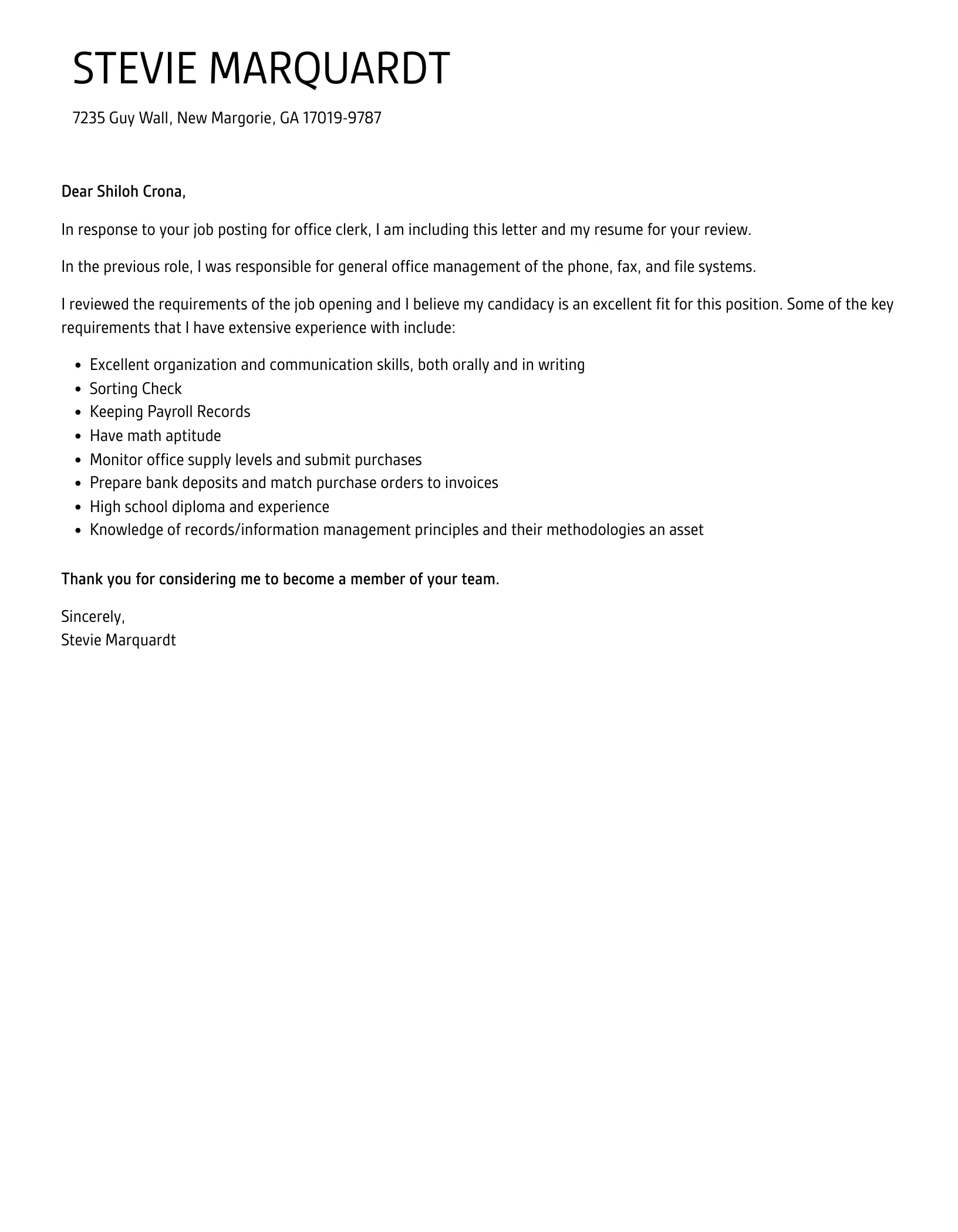
When highlighting your experience, focus on the tasks and responsibilities that are most relevant to the office clerk position. This includes experience with administrative duties, such as managing correspondence, scheduling appointments, and maintaining records. Provide specific examples of your accomplishments. Instead of simply stating “managed filing systems,” describe how you improved efficiency, reduced errors, or streamlined processes. Use action verbs to describe your duties and responsibilities. Quantify your achievements whenever possible, such as the number of files managed, the volume of correspondence handled, or the percentage of improved efficiency. Tailor your descriptions to match the job description, emphasizing the skills and experiences the employer is seeking. This targeted approach demonstrates your understanding of the role and your ability to contribute effectively.
Showcasing Skills and Abilities for Office Clerk Roles
An effective cover letter highlights skills and abilities that make you a strong candidate. Office clerks must possess a range of abilities that contribute to the smooth functioning of the office environment. Focus on both hard and soft skills to give a full picture of your capabilities. Administrative skills, communication skills, and organizational skills are critical. Use specific examples to demonstrate your proficiency in each area. Your descriptions should be targeted, demonstrating how your skills and abilities align with the job’s specific requirements. Showcasing your abilities convinces the hiring manager of your suitability for the office clerk position.
Administrative Skills
Administrative skills form the backbone of an office clerk’s role. Highlight your proficiency in tasks such as data entry, managing spreadsheets, and handling mail. Describe any experience with office equipment, like printers, scanners, and phone systems. Mention any relevant software proficiency, such as Microsoft Office Suite, Google Workspace, or any other software required in the job description. Provide concrete examples, such as how you improved data accuracy, streamlined a filing system, or managed a high volume of incoming calls. Being able to quickly learn new software and adapt to office procedures is also valuable.
Communication Skills
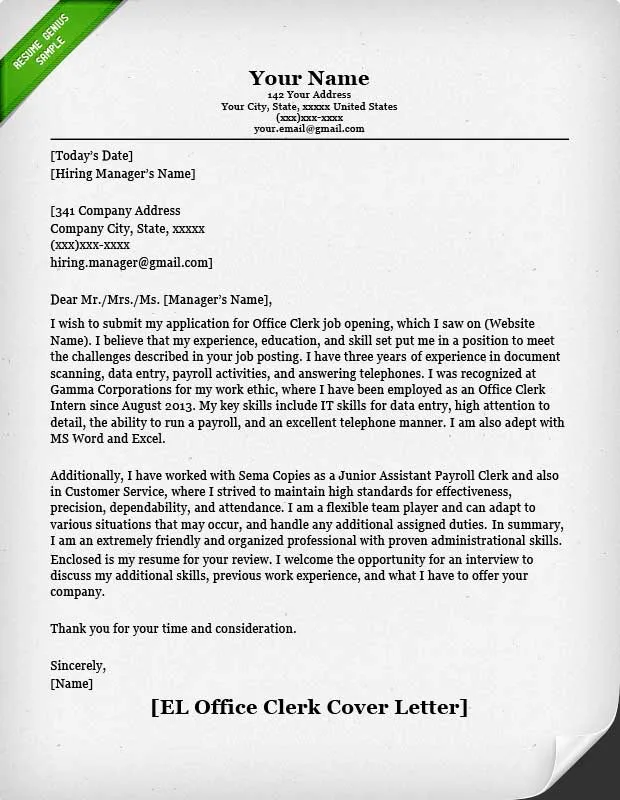
Strong communication skills are essential for effective office clerk performance. Demonstrate your ability to communicate clearly and professionally both verbally and in writing. Provide examples of how you have handled customer inquiries, resolved conflicts, or prepared reports. Highlight your active listening skills. If you have experience writing emails, memos, or other business correspondence, provide examples of how you ensured clarity and professionalism. Mention any experience with phone etiquette and handling a multi-line phone system. Your communication skills are central to building positive relationships with colleagues and clients.
Organizational Skills
Organizational skills are crucial for managing tasks efficiently. Provide evidence of your ability to prioritize, manage time effectively, and handle multiple tasks simultaneously. Describe your experience in maintaining filing systems, organizing documents, and managing schedules. Give examples of how you have created or improved organizational processes. If you have experience with project management or coordinating meetings, mention this experience, highlighting your ability to keep track of details and meet deadlines. Your organizational skills are important for efficient office operations.
Quantifying Achievements in Your Cover Letter
Quantifying your achievements adds credibility and impact to your cover letter. Instead of stating that you have experience managing files, provide specific numbers, such as “managed over 500 client files.” Use metrics to demonstrate your efficiency and effectiveness. Instead of writing, “improved customer satisfaction,” state “increased customer satisfaction scores by 15% through improved customer service.” Quantifiable results prove your abilities and demonstrate your value. Use metrics to demonstrate your positive impact, proving your ability to deliver results. This approach is essential for catching the hiring manager’s attention and showcasing your potential contributions.
Tailoring Your Cover Letter to the Job Description
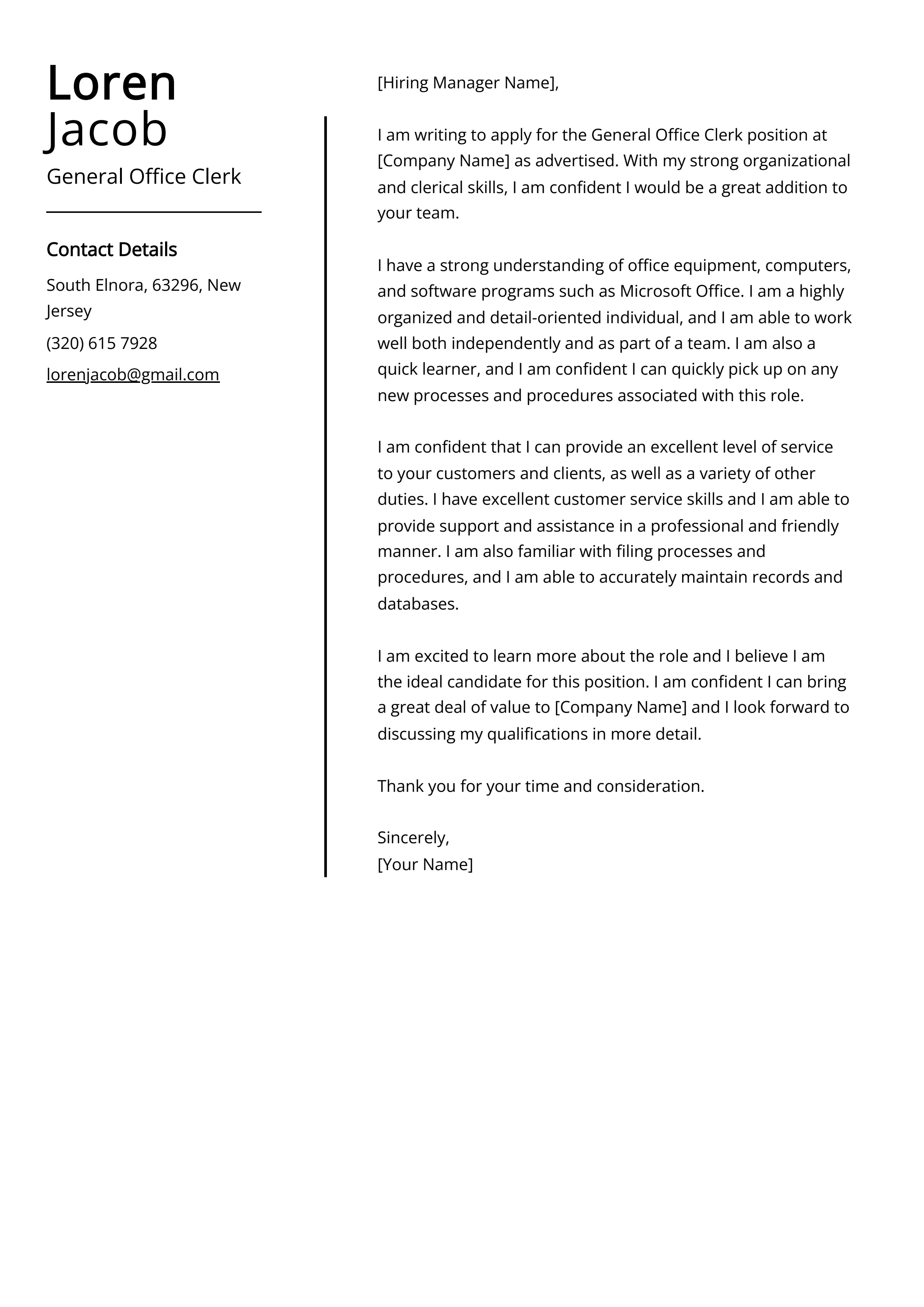
Tailoring your cover letter is crucial for making a positive impression. Carefully review the job description, identifying the key skills, experience, and qualifications the employer is seeking. Customize your cover letter to directly address these requirements, highlighting your relevant experience and skills. Use keywords from the job description throughout your letter, especially in the opening paragraph, in your descriptions of experience, and when discussing your skills. This targeted approach demonstrates your understanding of the role and your ability to meet the employer’s needs. Tailoring shows that you took the time to understand the company’s needs and makes your application stand out.
Closing Your Cover Letter Effectively
The closing paragraph should summarize your interest and reiterate your enthusiasm for the office clerk position. State your desire for an interview and express your availability. Thank the hiring manager for their time and consideration. You may also include a call to action, such as stating that you look forward to hearing from them soon. Keep the tone professional and enthusiastic. A strong closing reinforces your interest and leaves a lasting impression. Make sure to use a professional closing like “Sincerely” or “Best regards” and include your full name.
Proofreading and Editing Your Cover Letter
Proofreading and editing are essential steps. Ensure that your cover letter is free of grammatical errors, spelling mistakes, and typos. Read your letter multiple times, and consider using a spell-checker and grammar-checking tool. It’s useful to have another person review your letter for clarity and accuracy. Pay attention to the formatting, ensuring that your letter is easy to read. A well-edited cover letter demonstrates attention to detail and professionalism. It shows that you take your application seriously and are committed to presenting yourself in the best possible light. Proofreading ensures that your skills and experience are well-presented.
